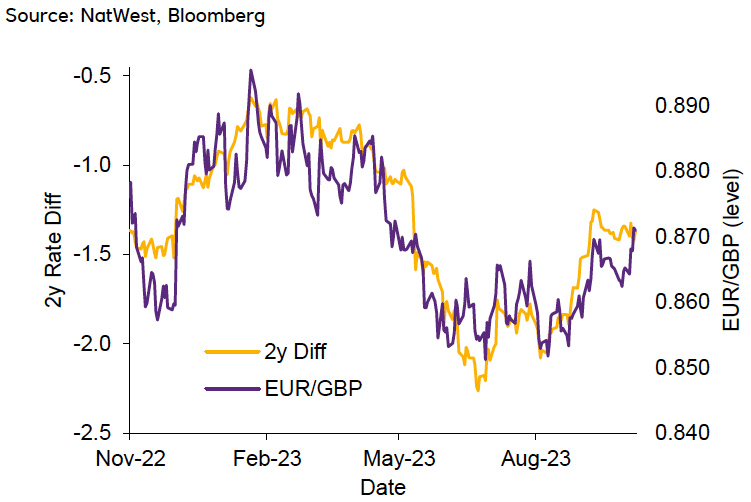NatWest: Pound Sterling to Peak Against Euro and Dollar in Q3 2024

Image © Adobe Stock
NatWest expects the British Pound to steadily advance against the Euro and Dollar until about the third quarter of 2024 before paring gains into year-end as the Bank of England takes a knife to interest rates.
According to a year-ahead analysis from NatWest, attractive UK bond yields will be the lynchpin of GBP strength, particularly in the first half of the year.
NatWest's economists expect the UK to have one of the highest nominal policy rates in the G10 for much of next year.
"Yield differentials are set to move in favour of Sterling," says Paul Robson, Head of FX Strategy for EMEA at NatWest Markets.
Above: Rate spreads will likely continue to be in charge of GBP/EUR and GBP/USD in 2024 says NatWest. Image: EUR/GBP versus euro area/UK 2y rate spreads.
The Federal Reserve is expected to start cutting interest rates in earnest from May, resulting in a steady advance in the Pound to Dollar exchange rate to a peak of around 1.31 by around the end of the third quarter.
The European Central Bank (ECB) is tipped to raise rates before the Bank of England, pushing EUR/GBP to a low of 0.85 around the start of the third quarter.
"We see downside should the ECB turn out to be the first major central bank to ease policy. But aggressive BoE rate cuts when they do arrive should see EUR/GBP recover later in '24," says Robson.
NatWest looks for the first Bank of England interest rate cut in the third quarter of 2023, with two 50bp cuts seen in August and November, which analysts expect will call time on the Pound's advance.
The Pound to Dollar exchange rate is pencilled in for 1.24 by the end of March, 1.27 by the end of June, 1.31 by the end of September and 1.30 by the end of the year.
The Euro to Pound rate is seen at 0.87, 0.85, 0.87 and 0.88 at these time points, giving a Pound to Euro profile of 1.15, 1.18, 1.15 and 1.14.
NatWest's year-ahead outlook was published ahead of the December 20 inflation print that revealed headline CPI fell well below expectations to 3.9% year-on-year in November, with all sub-components of the dataset undershooting.
Money markets are now priced for an interest rate cut as soon as March, which is well ahead of the assumptions made at NatWest at the time of their year-ahead research document.
Above: Rate cut expectations have increased significantly today. Chart updated 09:14 GMT, 20/12/23. Source: Refinitiv. Courtesy of @Capital Edge
Robson says downside risks to Sterling exchange rates relate to an earlier, deeper loosening of monetary policy by the Bank of England, a realistic possibility given the inflation's trajectory.
At the same time, upside risks to Pound Sterling centre on UK growth turning out stronger than expected and wrong-footing a bearish consensus for the UK to be the worst-performing G30 economy next year.
With inflation falling and interest rate cuts beckoning, the recent trend of improving consumer and business confidence can continue as real incomes and sentiment rise.
The UK government will also find itself with further headroom for giveaways in next year's budget as the cost of debt repayments falls alongside inflation.


